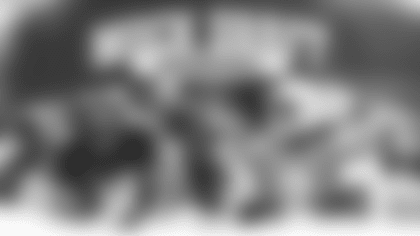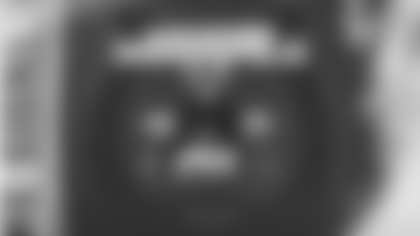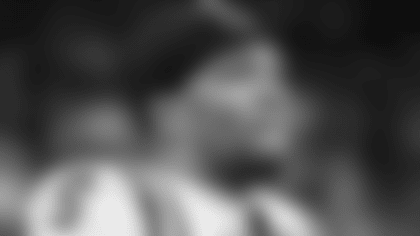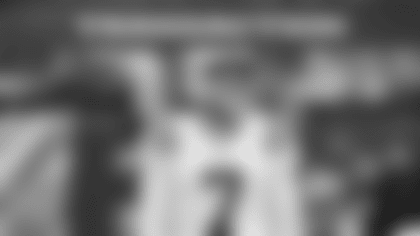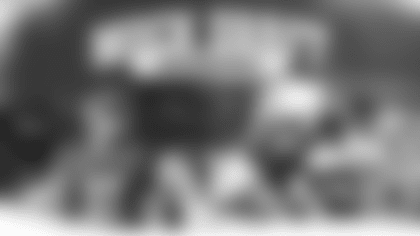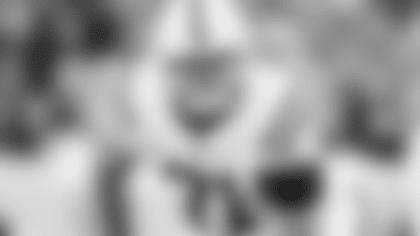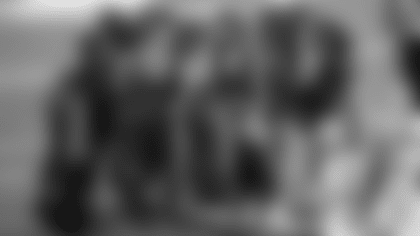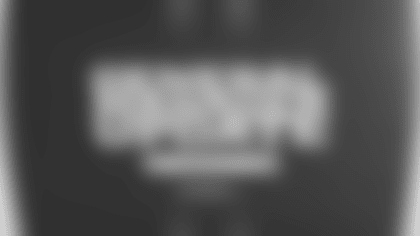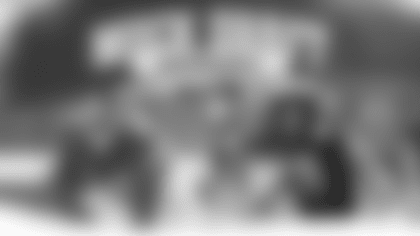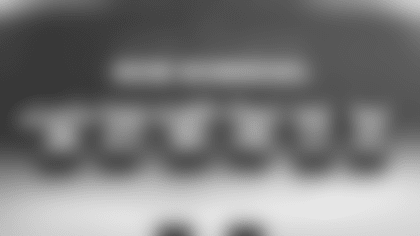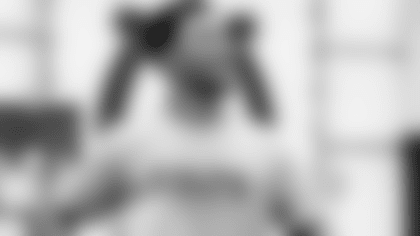INDIANAPOLIS — Indianapolis Colts quarterbacks coach Marcus Brady recently sat down for a Colts.com 1-on-1 interview. What are his thoughts on what he hopes to teach — and learn from — Philip Rivers, his parallels with Jacoby Brissett, Jacob Eason's goals for his rookie year and more?
Here is that interview, which you can listen to in its entirety above:
You've played and coached the quarterback position at the professional level. Is there any other occupation that comes to mind you can think of that even comes close to comparing to everything that's put on the plate of a QB on gameday?
Brady: "I mean, nothing comes to mind, and obviously I played the quarterback position for a long time and coached for a long time. It is a tough situation, but guys that play the position, they love it. I know Philip (Rivers) loves it, Jacoby (Brissett) loves it. There's a lot going on; I mean, in your mind it's like you always say, it's controlled chaos, 'cause it's chaos out there, but in your mind you've prepared yourself to be able to handle those situations where you're able to tune everything out, and now you're just executing your technique that you do in practice, and the game becomes slower. That's the only way to be able to get through those situations."
You have experience in your playing career with going through a quarterback battle that didn't end up going your way, and then you had to become the backup. But do you draw from that experience now when interacting with Jacoby Brissett, who was the starter last year and now will back up Philip Rivers?
Brady: "Yes … but that situation, I just brought that up earlier, it is, it's a very similar situation. Anthony Calvillo, his wife actually was diagnosed with cancer, so she was going through chemo, so he actually stopped playing. So there was still a half-season left; you know, I took over the job, I started slow but then got it going and got us to the playoffs, played well in that game. We lost the game in the playoffs and (I) was still voted the MVP of the game, so, you know, my last game, even though we lost and (are) disappointed, I felt my performance was well enough to get an opportunity. And so the next year coming in we end up getting Marc Trestman, (who) comes in as the new head coach, and as soon as he signs he says Anthony Calvillo is my starting quarterback. And so there was frustration in that then, and there was disappointment and I was hurt. But I got through it; as a professional you understand that's out of my control, I can't control it. I'm still gonna go out there, work my butt off in the offseason; I'm still gonna go out there and prepare myself that if he goes down I'm gonna be ready to lead the team. And so I share that with Jacoby, and I talked to him as he vents to me, and when it first happened — he's in a good spot now — but, to him, you can't let the situation of what you can't control affect who you are; who you are as a person, who you are as a quarterback, who you are as a professional. And he's done that. He's been great in the meetings; he's been vocal in the meetings and he's contributed during the meetings. So that hasn't changed, and it's good to see that. And it's going to continue on. The next step is us getting together not virtually but actually in person and working together, but for the situation that we have now, I've thought he's handled it very well."
Philip Rivers is coming in as a 17-year NFL veteran who is one of the greatest to play the quarterback position in NFL history. Do you look forward to the opportunity to learn from him while he does the same in his first season with the Colts?
Brady: "Yes, learning just how he sees the game and being able to learn from him as far as he has, obviously, a wealth of experience, like you said, on whether it's certain concepts or whether it's breaking the huddle, how he uses the cadence. Just the little nuances, you know, you learn from him; what he's comfortable, what he's not comfortable with. And then just as far as me as a quarterback just providing him with the tools to go out there, whether it's the different concepts — you know, there's some things that he didn't do with the Chargers that we do here, and it's new to him, and so I'm teaching him those things, whether it's the footwork, whether it's just different schemes; the way we handle protections here is a little bit different than what he did with the Chargers, and that's kind of my area with pass protection there, so I'm able to help him in that aspect, which, obviously, he picks up just like that. But it's been a good dialogue with him."
The Colts' offensive line is considered one of the best in the NFL. As quarterbacks, how do you try to take advantage of having five of the best protectors the league has to offer?
Brady: "Well, it just gives you that much more confidence as a quarterback, and then as a coach and as a playcaller. You feel like you can open up your offense in every aspect; obviously we could just pound the ball, run the ball, because no matter if they stack the box we've got guys that are gonna move people and open up holes for the dynamic backs that we have. And then the protection aspect, it's like, 'OK, well, if they're stacking the box, we know we can drop back and throw it, and we're gonna feel protected, we're gonna feel safe in that pocket.' And if it's a play that's gonna take a little bit longer to develop, but you still have that confidence, so it just gives you that confidence in that offensive side of the ball."
Jacob Eason was taken in the fourth round of this year's NFL Draft. He's got a lot of exciting tools, but like any rookie, he's got some things to work on to become more consistent. What are some of those improvements you want to see?
Brady: "Well definitely he has the physical tools — a starting point. Obviously the big arm, the size. So, yes, definitely he has that. The No. 1 thing going from college to the pros is just how much information he's able to just take in, because our playbook is much bigger than what he had in Washington in college. And so digesting our offense, our system, and then just the detail of each play, because we do more checks — if we're not getting the right look, we'll get us to this play; if they're bringing pressure here, get us to this play. And so he's learning all of that, so not only learning it, now he's gotta process it. And we can't see that yet until he gets on the field, so it's that, 'Can he take what he's learning in the classroom, recognize it when he steps out the huddle, and then process it and make the change in the matter of time before the play clock hits?' How quickly is that process and speed, and then how quickly is it processing post-snap when he's in the pocket taking his drop? So there's a lot of just time that it's gonna take him, but he's doing a great job with what he's been asked to do now; he's learning and asking questions and picking it up."
Taking the current social climate into consideration — we've heard from Chris Ballard and Frank Reich on this — there have been some emotional meetings with the team this offseason. How impactful were those sessions for you?
Brady: "Oh, no, it was amazing (that) week. I know I commend Frank Reich and Ballard for giving this team just that platform to be able to do that; you know, opening up (and) understanding that this was more important than football. This is about just people and about the family that we have here as the Colts family. And opening up the floor and hearing all the different stories — and a lot of people shared their stories of their experience of social injustice, their experience with racism — and then you've got guys that didn't experience (it) that were coming up and offering their support and understanding that, you know, we're your brother and they're gonna be there for you. So in that aspect, I mean, I thought it was awesome. I know it brought us closer together as players, coaches — just as one family — as we build relationships amongst everybody in the Colts family. So, you know, it's a tough issue to deal with; you know, it's not going to go away anytime quickly, and it'll take everybody working together for one common goal. And I think this is a step forward for what Chris and Frank had us do, to speak amongst each other; the first thing is just to have the dialogue, educate everybody around so we know what we're actually talking about, we can be on the same level and have these tough discussions. And so it starts with educating each other."



